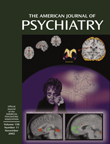Transdermal Selegiline in Major Depression: A Double-Blind, Placebo-Controlled, Parallel-Group Study in Outpatients
Abstract
OBJECTIVE: The authors investigated the efficacy and safety of transdermal selegiline in adult outpatients with major depressive disorder. METHOD: Following a 1-week placebo lead-in, 177 adult outpatients with major depressive disorder were randomly assigned to receive transdermal selegiline (20 mg applied once daily by means of a 20-cm2 patch) (N=89) or placebo (N=88) for 6 weeks. The patients followed a tyramine-restricted diet during the medication trial and for 2 weeks after completion of treatment. Response to medication or placebo was measured by using the 17-item and 28-item versions of the Hamilton Depression Rating Scale, the Montgomery-Åsberg Depression Rating Scale, and the Clinical Global Impression (CGI) severity and improvement measures. RESULTS: Greater improvement was observed after 6 weeks in patients treated with transdermal selegiline than in those given placebo according to all measures. A statistically significant difference between drug and placebo was seen in Hamilton depression scale and Montgomery-Åsberg Depression Rating Scale scores as early as week 1 of treatment. There were no differences in the adverse event profile of the patients given selegiline and those given placebo with the exception of application-site reactions, which were more common with the selegiline transdermal system. No orthostatic hypotensive or hypertensive reactions were observed. CONCLUSIONS: Transdermal selegiline (20 mg applied once daily by means of a 20-cm2 patch) administered for 6 weeks was an effective and well-tolerated treatment for adult outpatients with major depression. The typical side effects commonly seen with traditional monoamine oxidase inhibitor antidepressants were not observed.



